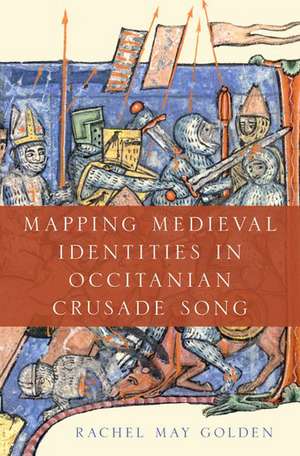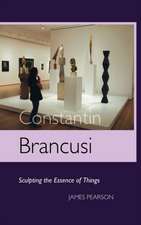Mapping Medieval Identities in Occitanian Crusade Song
Autor Rachel May Goldenen Limba Engleză Hardback – 17 noi 2020
Preț: 353.97 lei
Preț vechi: 401.39 lei
-12% Nou
Puncte Express: 531
Preț estimativ în valută:
67.73€ • 70.91$ • 56.04£
67.73€ • 70.91$ • 56.04£
Carte disponibilă
Livrare economică 04-10 martie
Preluare comenzi: 021 569.72.76
Specificații
ISBN-13: 9780190948610
ISBN-10: 0190948612
Pagini: 308
Ilustrații: 6 halftones, 1 figure, 9 musical examples
Dimensiuni: 236 x 155 x 25 mm
Greutate: 0.59 kg
Editura: Oxford University Press
Colecția OUP USA
Locul publicării:New York, United States
ISBN-10: 0190948612
Pagini: 308
Ilustrații: 6 halftones, 1 figure, 9 musical examples
Dimensiuni: 236 x 155 x 25 mm
Greutate: 0.59 kg
Editura: Oxford University Press
Colecția OUP USA
Locul publicării:New York, United States
Recenzii
Golden's music-textual study of geospatial themes in (especially) Occitanian crusade song, as well as her appendix (which provides a concordance of over sixty songs that invoke crusade together with existing modern editions), rounds out a body of material that could readily serve as the foundation for an illuminating academic course on the culture of medieval crusade.
Focusing on fundamental concepts of crusade such as circularity, pilgrimage, dualism, and the spatio-temporal coordinates related to both Biblical topography and contemporary geography of military campaigns, Golden provides innovative readings of crusade songs as sonic and mobile phenomena. Mapping Medieval Identities successfully demonstrates how these songs cultivate regional (Occitan) and personal identities inflected by the experience of crusade.
Rachel Golden has produced a study that ranges over a wide variety of crusader song and successfully situates it in the rich cultural, social and political context of the Central Middle Ages. The book offers vivid insights into a body of song that illuminates the dynamics of a conflict between civilizations that occupied societies of the Mediterranean basin for half a millennium and strongly resonates in today's society.
Employing a wide range of interdisciplinary perspectives, engaging with music and literature in different languages, anthropology, historiography, and literary criticism, this book contributes to a holistic understanding of the phenomenon of the Crusades and actively invites its readers to reflect on uses of us-versus-them rhetoric and modern perceptions of Otherness.
Focusing on fundamental concepts of crusade such as circularity, pilgrimage, dualism, and the spatio-temporal coordinates related to both Biblical topography and contemporary geography of military campaigns, Golden provides innovative readings of crusade songs as sonic and mobile phenomena. Mapping Medieval Identities successfully demonstrates how these songs cultivate regional (Occitan) and personal identities inflected by the experience of crusade.
Rachel Golden has produced a study that ranges over a wide variety of crusader song and successfully situates it in the rich cultural, social and political context of the Central Middle Ages. The book offers vivid insights into a body of song that illuminates the dynamics of a conflict between civilizations that occupied societies of the Mediterranean basin for half a millennium and strongly resonates in today's society.
Employing a wide range of interdisciplinary perspectives, engaging with music and literature in different languages, anthropology, historiography, and literary criticism, this book contributes to a holistic understanding of the phenomenon of the Crusades and actively invites its readers to reflect on uses of us-versus-them rhetoric and modern perceptions of Otherness.
Notă biografică
Rachel May Golden is Associate Professor of Musicology in the School of Music at the University of Tennessee, where she heads the Musicology area. Her work has appeared in The Journal of Musicology, Music & Letters, Musical Quarterly, and Opera Quarterly, among other publications. She has been an American Council of Learned of Societies Fellow and an NEH Summer Scholar.


